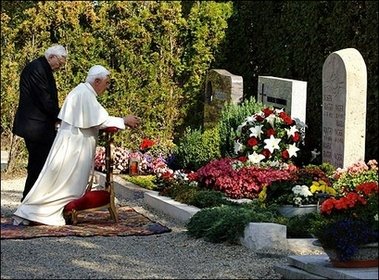
Yesterday, Wednesday, September 13, 2006, the Holy Father visited his brother, Georg, and spent time in prayer at the graves of his father, mother, and sister.
Image Source: AFP/Pool/Wolfgang Radtke


This venerable house of God, the Basilica of "Our Lady of the Old Chapel," has been splendidly refurbished and today receives a new organ, which will now be blessed and solemnly dedicated to its proper aim: the glorification of God and the strengthening of faith.
An important contribution to the renewal of sacred music in the 19th century was made by a canon of this collegiate church, Carl Joseph Proske. Gregorian chant and classic choral polyphony were integrated into the liturgy. The attention given to liturgical sacred music in the "Old Chapel" was so significant that it reached far beyond the confines of the region, making Regensburg a center for the reform of sacred music, and its influence has continued to the present time.
In the constitution on sacred liturgy of the Second Vatican Council ("Sacrosanctum Concilium"), it is emphasized that the "combination of sacred music and words … forms a necessary or integral part of the solemn liturgy" (No. 112). This means that music and song are more than an embellishment of worship; they are themselves part of the liturgical action.
Solemn sacred music, with choir, organ, orchestra and the singing of the people, is not an addition of sorts that frames the liturgy and makes it more pleasing, but an important means of active participation in worship. The organ has always been considered, and rightly so, the king of musical instruments, because it takes up all the sounds of creation and gives resonance to the fullness of human sentiments. By transcending the merely human sphere, as all music of quality does, it evokes the divine.
The organ's great range of timbre, from "piano" through to a thundering "fortissimo," makes it an instrument superior to all others. It is capable of echoing and expressing all the experiences of human life. The manifold possibilities of the organ in some way remind us of the immensity and the magnificence of God.
Psalm 150 speaks of trumpets and flutes, of harps and zithers, cymbals and drums; all these musical instruments are called to contribute to the praise of the triune God. In an organ, the many pipes and voices must form a unity. If here or there something becomes blocked, if one pipe is out of tune, this may at first be perceptible only to a trained ear. But if more pipes are out of tune, dissonance ensues and the result is unbearable.
Also, the pipes of this organ are exposed to variations of temperature and subject to wear. Now, this is an image of our community. Just as in an organ an expert hand must constantly bring disharmony back to consonance, so we in the Church, in the variety of our gifts and charisms, always need to find anew, through our communion in faith, harmony in the praise of God and in fraternal love. The more we allow ourselves, through the liturgy, to be transformed in Christ, the more we will be capable of transforming the world, radiating Christ's goodness, his mercy and his love for others.
The great composers, each in his own way, ultimately sought to glorify God by their music. Johann Sebastian Bach wrote above the title of many of his musical compositions the letters S.D.G., "Soli Deo Gloria" -- to God alone be glory. Anton Bruckner also prefaced his compositions with the words: "Dem lieben Gott gewidmet" -- dedicated to the good God. May all those who enter this splendid basilica, experiencing the magnificence of its architecture and its liturgy, enriched by solemn song and the harmony of this new organ, be brought to the joy of faith.
[Translation issued by the Holy See; adapted]
© Copyright 2006 -- Libreria Editrice Vaticana



 Ember Days are set aside to pray and/or offer thanksgiving for a good harvest and God's blessings. If you are in good health, please at least fast during these three days and pray the additional prayers. Remember the words from the Gospel: "Unless you do penance, you shall likewise perish" (Luke 13:5)
Ember Days are set aside to pray and/or offer thanksgiving for a good harvest and God's blessings. If you are in good health, please at least fast during these three days and pray the additional prayers. Remember the words from the Gospel: "Unless you do penance, you shall likewise perish" (Luke 13:5) From Catholic News Agency:
At the conclusion of his fourth day in Bavaria, Pope Benedict XVI prayed with members of Germany’s Orthodox and Protestant community. Leading a Vesper service at Regensburg’s Cathedral, the Pontiff told those gathered that they must not loose track of what is central to their dialogue - their common belief in Christ - and that they should bear witness to their common faith “in such a way that it shines forth as the power of love.”
The liturgy, which was punctuated by German hymns, common to all traditions, also included traditional Orthodox chant and a response from leaders of all three Christian groups.
Pope Benedict began his reflection by welcoming the religious leaders and noting that at the heart of the liturgy is the praying of the Psalms, which connects the Christian church with Jewish believers as well.
Benedict next noted the ongoing dialogue between the Catholic and Orthodox Churches, especially the conversations which are taking place in Germany itself. “I hope and pray that these discussions will be fruitful and that the communion with the living God which unites us, like our own communion in the faith transmitted by the Apostles, will grow in depth and maturity towards that full unity.”
“’So that the world may believe,’” the Pope emphasized, “we must become one: the seriousness of this commitment must spur on our dialogue.”
The Pope then turned to welcome “the various traditions stemming from the Reformation.” While he noted the particular work being done in the attempt to reach a consensus on justification, the Pope also pointed to a problem arising in society at large. “Our modern consciousness, in general, is no longer aware of the fact that we stand as debtors before God and that sin is a reality which can be overcome only by God’s initiative. Behind this weakening of the theme of justification and of the forgiveness of sins is ultimately a weakening of our relation with God. In this sense, our first task will perhaps be to rediscover in a new way the living God present in our lives.”
Turning to the liturgy’s reading from the Gospel of St. John, the Pope noted that what ultimately sets Christians apart is the belief that “Jesus is the Son of God who has come in the flesh.” This, he said, must be the starting point of any dialogue. “In this common confession, and in this common task, there is no division between us. And we pray that this shared foundation will grow ever stronger.”
From this starting point, Benedict continued, we must become witnesses. And not just empty witnesses, but witnesses in love. As the reading points out, he concluded, “’We know and believe the love God has for us’. Yes, man can believe in love. Let us bear witness to our faith in such a way that it shines forth as the power of love, ‘so that the world may believe (Jn 17:21).’”
 Our catechism tells us, my children, that all men will undergo a particular judgment on the day of their death. No sooner shall we have breathed our last sigh than our soul, without leaving the place where it has expired, will be presented before the tribunal of God. Wherever we may die, God is there to exercise His justice. The good God, my children, has measured out our years, and of those years that He has resolved to leave us on this earth, He has marked out one which shall be our last; one day which we shall not see succeeded by other days; one hour after which there will be for us no more time. What distance is there between that moment and this -the space of an instant. Life, my children, is a smoke, a light vapour; it disappears more quickly than a bird that darts through the air, or a ship that sails on the sea, and leaves no trace of its course!
Our catechism tells us, my children, that all men will undergo a particular judgment on the day of their death. No sooner shall we have breathed our last sigh than our soul, without leaving the place where it has expired, will be presented before the tribunal of God. Wherever we may die, God is there to exercise His justice. The good God, my children, has measured out our years, and of those years that He has resolved to leave us on this earth, He has marked out one which shall be our last; one day which we shall not see succeeded by other days; one hour after which there will be for us no more time. What distance is there between that moment and this -the space of an instant. Life, my children, is a smoke, a light vapour; it disappears more quickly than a bird that darts through the air, or a ship that sails on the sea, and leaves no trace of its course! St. Padre Pio:
St. Padre Pio: